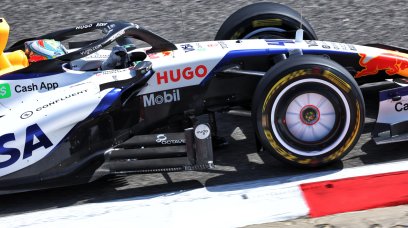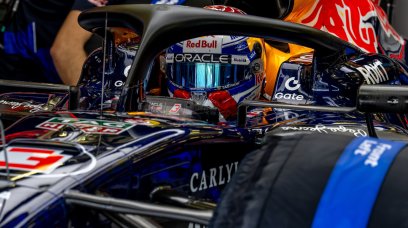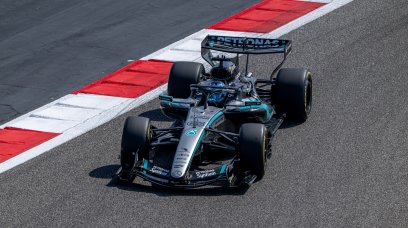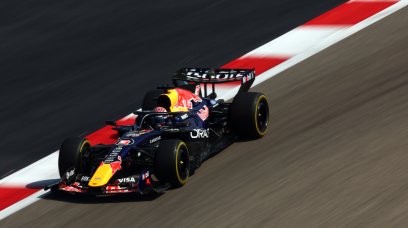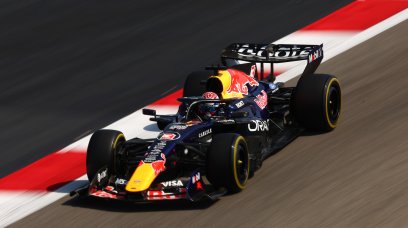In Formula 1 terms, crypto products are effectively the sport's 'new tobacco' - the products are controversial, the brands are flush with cash, have limited global marketing platforms, and chime with the high living image of F1. Equally, as many are discovering in France and elsewhere, the advertising of such products is not only becoming increasingly regulated, but the applicable laws are extremely hazy. Eight of ten teams currently have crypto partners of some sort, with Williams and Haas being the outliers. Indeed, some teams have two such partners: Alfa Romeo, with Vauld and Floki, and Red Bull Racing, who are partnered by ByBit and Tezos, the latter shared with McLaren. Also on a sharing kick are F1 and Aston Martin, who have both inked deals with Crypto.com. Another complication is that the term 'crypto' covers a variety of products, namely virtual currencies, trading platforms and virtual wallets. Factor in that some brands, such as controversial Alpine sponsor Binance, consist of trading exchanges and some form of cryptocoin, and the matter gets extremely complex, with teams being forced at short notice to take legal advice as to what is permitted in France, whose Autorité des Marche Financiers regulates internal financial markets. Depending upon product and target markets, certain products are registered with AMF, others are awaiting approval, and still others fall outside the AMF's scope. Thus, the massive confusion, with teams and sponsors generally erring on the side of caution. So, who is affected, and who is not?
Teams explain crypto branding decisions
Starting with Crypto.com, a spokesperson explained to RacingNews365.com the reasons for its decision to go invisible for the race. "Crypto.com decided they would not be exercising their branding rights for this race," the spokesperson said, "But it remains F1's global partner and we expect such rights to be leveraged in other ways at future races." The same decision applies to its Aston Martin partnership. Red Bull Racing had both its logos on display over the weekend after discussions with its crypto sponsors, saying: "Our legal team are aware of the situation, and we are in communication with our partners." Mercedes, too, took legal advice about displaying FTX branding before reaching the same decision. Ferrari sponsor Velas is blockchain-based and thus falls outside the AMF's ambit. "Velas Network AG informed us it does not provide services that would require registration with the [AMF] and therefore there is no advertisement prohibition with respect to the use of the Velas logo on the Scuderia Ferrari assets within the scope of the French GP," a spokesperson told RacingNews365.com .
In a statement, McLaren confirmed that the team is aware of recent updates on advertising restrictions on cryptocurrencies and had worked closely with partner OKX about the issue. It ran with that partner's branding over the French Grand Prix weekend, the statement concluded, albeit adding that the team was not in a position to comment on Tezos branding. Alpine confirmed that it had removed all Binance branding for this race from all its driver wear, race cars and trailers, and even the team's letterheads as an act of caution. A spokesperson for AlphaTauri, partnered by the Fantom digital ecosystem, said: "Knowing about the regulations here in France as for crypto currency, after discussions with our partner, it was decided to avoid any advertising on French soil." Alfa Romeo, too, removed all reference to crypto partners, saying, "The team is complying with all French regulations with regard to crypto partner advertising on the car. We have been advised that, in order to display a cryptocurrency partner logo in France, the cryptocurrency brand must be registered at the AMF, which is not the case of two of our cryptocurrency partners. "Therefore, the two brands Vauld (currency platform) and Floki (cryptocurrency) will not be featured on our car this weekend."
French laws historically stringent
That such restrictions would be imposed in France is no surprise to the F1 community: the country has for many years had the most stringent anti-tobacco, -alcohol and -gambling laws in Europe, as Williams discovered for this race in 2018: It was forced to remove all Martini branding, not only for the race but also for transit through France from the previous and to the next race. However, the word is that the situation will become a lot more complicated. Already there is talk of EU-wide bans on the marketing of certain cryptocurrencies and platforms. Thus, teams will have to be even more diligent with their choice of crypto partners.
Most read


